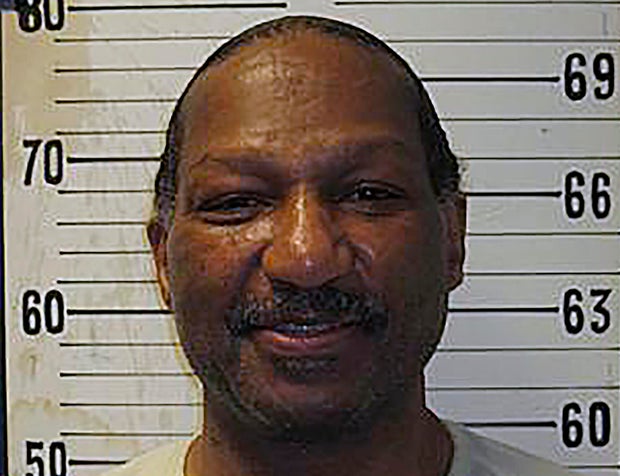
Tennessee executed an inmate Tuesday without deactivating his implanted defibrillator, despite uncertainty about whether the device would shock his heart when the lethal chemicals took effect. Experts say it marked the first time a man has been put to death with a working heart device in his chest.
Byron Black was executed after a back-and-forth in court over whether officials would need to turn off his implantable cardioverter-defibrillator, or ICD.
Gov. Bill Lee declined Monday to grant a reprieve, clearing the way for Black’s execution after a legal battle and ongoing uncertainty about whether the implantable cardioverter-defibrillator will shock his heart when the lethal drug takes effect.
The nonprofit Death Penalty Information Center said it was unaware of any other cases in which a person on death row made similar claims to Black’s about defibrillators or pacemakers. Black’s attorneys said they had not found a comparable case, either.
Lee said the courts “universally determined that it is lawful to carry out the jury’s sentence of execution given to Mr. Black for the heinous murders of Angela Clay and her daughters Lakeisha, age 6, and Latoya, age 9.”
The U.S. Supreme Court on Monday rejected Black’s appeals. The execution was Tennessee’s second since May, after a pause for five years, first because of COVID-19 and then because of missteps by state corrections officials.
Twenty-eight men have died by court-ordered execution so far this year in the U.S., exceeding the 25 carried out last year and in 2018. It is the highest total since 2015, when 28 people were put to death.
According to the Death Penalty Information Center, Tennessee has 46 inmates on death row. The state has granted clemency three times.
Black’s condition
Black, 69, was in a wheelchair, and he had dementia, brain damage, kidney failure, congestive heart failure and other conditions, his attorneys had said.
His implantable cardioverter-defibrillator is a small, battery-powered electronic device that is surgically implanted in the chest. It served as a pacemaker and an emergency defibrillator. Black’s attorneys said in order to be sure it was off, a doctor would have to place a programming device over the implant site, sending it a deactivation command, with no surgery required.
AP
In mid-July, a trial court judge agreed with Black’s attorneys that officials must have his device deactivated to avert the risk that it could cause unnecessary pain and prolong the execution. But the state Supreme Court intervened July 31 to overturn that decision, saying the other judge lacked the authority to order the change.
The state had disputed that the lethal injection would cause Black’s defibrillator to shock him. Even if shocks were triggered, Black wouldn’t feel them, the state said.
Black’s attorneys had countered that even if the lethal drug being used, pentobarbital, renders someone unresponsive, they aren’t necessarily unaware or unable to feel pain.
Kelley Henry, Black’s attorney, said previously that the execution could become a “grotesque spectacle.” According to the Tennessee Department of Corrections, seven media members had been selected witnesses to the execution at the Riverbend Maximum Security Institution.
The legal case also spurred a reminder that most medical professionals consider participation in executions a violation of health care ethics.
Black’s case
Black was convicted in the 1988 shooting deaths of girlfriend Angela Clay, 29, and her two daughters, Latoya, 9, and Lakeisha, 6. Prosecutors said Black was in a jealous rage when he shot the three at their home. At the time, Black was on work-release while serving time for shooting and wounding Clay’s estranged husband.
Linette Bell, whose sister and two nieces were killed, recently told WKRN-TV: “He didn’t have mercy on them, so why should we have mercy on him?”
Black had already seen three execution dates come and go, due to the COVID-19 pandemic and a pause on executions after the Department of Correction was found to not be testing the execution drugs for potency and purity as required.
Intellectual disability claim
In recent years, Black’s legal team unsuccessfully tried to get a new hearing over whether he was intellectually disabled and ineligible for the death penalty under U.S. Supreme Court precedent.
His attorneys said that if they had delayed a prior attempt to seek his intellectual disability claim, he would have been spared under a 2021 state law.
Last month, Black’s lawyers sent a letter to Tennessee’s governor, urging him to grant Black clemency and asking him to commute his sentence to life in prison.
“Mr. Black, who lives with an intellectual disability, has been on death row for 25 years,” the letter read. “From infancy, he suffered from the effects of prenatal alcohol exposure, resulting in Fetal Alcohol Syndrome. As a toddler, he was exposed to toxic lead, compounding his lifelong cognitive and developmental impairments.”
Nashville District Attorney Glenn Funk contended in 2022 that Black is intellectually disabled and deserved a hearing under that 2021 law, but the judge denied it. That is because the 2021 law denies a hearing to people on death row who have already filed a similar request and a court has ruled on it “on the merits.”
In Funk’s attempt, he focused on input from an expert for the state in 2004 who determined back then that Black didn’t meet the criteria for what was then called “mental retardation.” But she concluded that Black met the new law’s criteria for a diagnosis of intellectual disability.
Black also sought a determination by the courts that he was incompetent to be executed.


